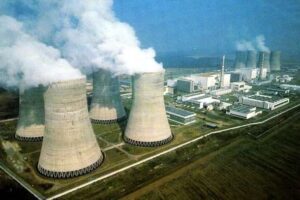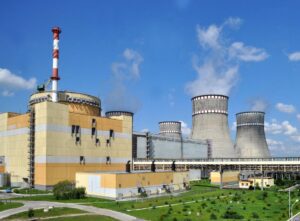
As of Sunday, all nine nuclear power units in the government-controlled territory of Ukraine were operating, but the work of several of them was being limited due to the unreadiness of the energy system to accept all the energy produced from them, the nuclear power plant operator NAEC Energoatom said.
“On December 18, 2022, as of 13:00, all nine nuclear power units located in Ukraine-controlled territory were operating. However, the total capacity of the two units is limited by more than 600 MW due to the unpreparedness of the energy system to receive from them the full possible amount of electricity, as the energy infrastructure facilities have not yet been restored after the shelling of December 16,” the report says.
It specifies that the NAEK expects the infrastructure to be restored as soon as possible to “enable the full available capacity from domestic NPPs as soon as possible.

All nine nuclear power units located in Ukraine-controlled territory are operating in the power system as of 6 p.m. Saturday, nuclear power plant operator NAEC Energoatom said in a telegram.
“Unfortunately, now the capacity of one of the power units is limited by 600 MW due to the unpreparedness of the power system to take all possible amount of electricity from it, as the energy infrastructure facilities were again damaged as a result of yesterday’s shelling,” Energoatom specified.
The Company reminded that another six power units of the occupied Zaporizhzhia NPP are stopped and their switching on is blocked by the “Rashites,” while the plant continues to constantly consume about 100 MW for its own needs from the power system of Ukraine.
As reported, after the November 23 shelling, all power units of Ukrainian nuclear power plants were disconnected from the grid. On December 13, after remedial repairs, the ninth 1000 MW unit was connected to the power grid, and by the new massive Russian shelling in the morning of November 16, all nine units of the Pivdenno-Ukrainian, Rivne and Khmelnitsky NPPs, which are located in Ukraine-controlled territory, were in operation.
According to Jakob Hartmut, vice president of NAEK Energoatom, the December 16 shelling resulted in the total operating capacity of the plants under control decreasing from 7 to 1.5 thousand MW.
There are four operating nuclear power plants in Ukraine, including 15 units, equipped with water-water power reactors with a total installed electric capacity of 13.835 GW. Apart from ZNPP with six 1000 MW units, there is Rivne NPP (four units, two 1000 MW and two 440 MW), Pivdenno-Ukrainian NPP (three 1000 MW units) and Khmelnitsky NPP (two 1000 MW units).

The leaders of Azerbaijan, Georgia, Romania and Hungary have signed an agreement on laying a submarine electric cable under the Black Sea to supply Azerbaijani energy to Europe.
Ursula von der Leyen, head of the European Commission (EC), considers the Black Sea electricity cable project, which will supply Azerbaijan with electricity to Europe, ambitious.
“I can only say: what an ambitious project (of the Black Sea electric cable). It will connect us on both sides of the Black Sea and go further toward the Caspian Sea – both for digital communications and energy,” von der Leyen said Saturday at a signing ceremony in Bucharest for the “Strategic Partnership Agreement on the Development and Transmission of Green Energy between the governments of Azerbaijan, Georgia, Romania and Hungary.”
She said the implementation of the agreements will help the European Union strengthen security of supply by transmitting electricity from renewable sources to the EU through Romania and Hungary. “A cable under the Black Sea could supply electricity to our neighbors in Moldova and the Western Balkans and, of course, to Ukraine,” the EC head said.
According to EU Commissioner for Enlargement and Neighborhood Policy Oliver Varghea, an agreement between Azerbaijan, Georgia, Romania and Hungary on a submarine cable for electricity transmission via the Black Sea (Black Sea Energy) was signed as part of a EUR 17 billion European investment plan.
The nearly 1,200-kilometer cable will transmit electricity from Azerbaijan and Georgia to Romania and Hungary. The project is to be implemented within six years.
Average salary of staff employees be regions (UAH)

State employment center

The Cabinet of Ministers of Ukraine included Uzhhorod industrial park in the register of industrial parks, the Economy Ministry’s press service said on Friday.
“The government is pursuing a consistent policy of creating conditions for the development of industrial parks as points of economic growth and post-war reconstruction of the country. The development of industrial parks will contribute to the recovery of industry, including export-oriented, with a high share of added value. It will also contribute to the development of local communities: they will get new budget revenues, new small and medium enterprises will be created in their regions”, stated First Deputy Prime Minister, Minister of Economy Yulia Sviridenko.
The new industrial park is situated in the city of Uzhgorod in Zakarpattya region. According to the concept of the industrial park, up to 500 working places in the production sphere (processing industry) are supposed to be created on the area of 10,1907 hectares.
Today the register of industrial parks includes 60 industrial sites.

The ninth package of EU sanctions against Russia adopted on Friday allows Bulgaria, Hungary and Slovakia, which received a reprieve from the European Union’s oil embargo on Russian oil, to export oil products produced from it to Ukraine.
The EU Council resolution published in the EU Official Journal on December 16 says the decision “allows Hungary, Slovakia and Bulgaria to export to Ukraine certain refined products derived from Russian crude oil imported on the basis of the considered derogations (from the embargo – IF), including, if necessary, by transit through other member states.”
Another paragraph of the ruling allows Bulgaria to “export to third countries certain petroleum products derived from Russian crude oil imported on the basis of the derogations under consideration.
The publication attributes this to the need to “reduce environmental and safety risks, as such products cannot be safely stored in Bulgaria.
The document specifies that the respective annual exports should not exceed the average annual volume of exports of such products for the last five years.